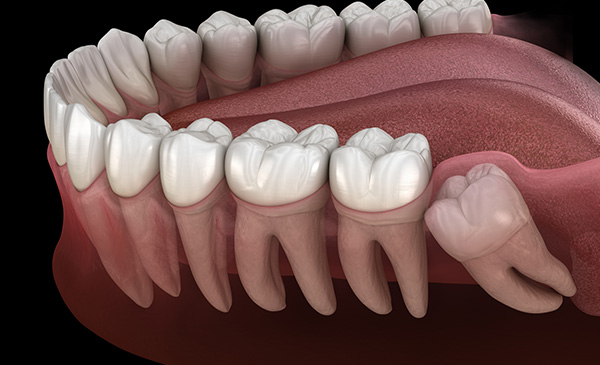Wisdom Teeth Extraction
Treatment alternatives
When we’re considering wisdom teeth, there are only two possibilities: Keep them. Remove them.
Wisdom teeth can cause problems
Your last molars, called the third molars or wisdom teeth, typically begin to come in (erupt) during the late teens or early twenties. When they don’t have room to grow in properly, they are considered impacted. This can cause serious problems:
A very painful infection, called pericoronitis, can affect a partially erupted wisdom tooth and the surrounding gums. This infection can spread into the face and jaw.
When a wisdom tooth tries to erupt at an angle, it can cause decay in the neighboring tooth. This happens because wisdom teeth are nearly impossible to keep free of plaque, and the area between the two teeth becomes a trap for the bacteria in plaque that cause tooth decay.
Additional bacteria in plaque cause periodontal (gum) disease, which may start near the wisdom teeth and spread throughout the mouth.
A fluid-filled sac called a cyst may develop around an impacted tooth. A cyst can destroy a great deal of bone in the jaw before it’s noticed.
Diagnosis and treatment
To determine if extracting wisdom teeth is right for your situation, we’ll do a thorough examination, which typically includes x-rays.
It’s often better to remove wisdom teeth early, while their roots are still small, even before the teeth have come in through the gums. This allows for easier removal, fewer complications, and faster healing.
Keeping wisdom teeth
A few lucky people are able to keep their wisdom teeth and take proper care of them. In many cases, though, there isn’t enough room in the jaw for wisdom teeth to come in properly. When a tooth cannot come in properly, we call it an impacted tooth.
Removing wisdom teeth
Removing wisdom teeth is sometimes the best choice for keeping your mouth healthy. If you delay extracting a wisdom tooth that should come out, serious problems can result, including:
painful infection of the gums
tooth decay
periodontal disease
destruction of the jawbone
You should also know that it’s often better to remove wisdom teeth while their roots are still small. Early removal can make the procedure easier and the healing process faster. Sometimes this means that wisdom teeth should be removed even before they have come in through the gums. If you wait too long before having wisdom teeth extracted, the roots can grow around or close to a nerve in the jaw, which may then be damaged during extraction. This could leave your lip and chin permanently numb.
For all these reasons, we often recommend extracting wisdom teeth early to help you keep your mouth and smile healthy.
Extracting wisdom teeth
For many people, the best treatment for wisdom teeth is to remove them. This treatment helps prevent future dental problems and maintain a healthy mouth and smile.






